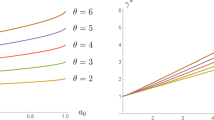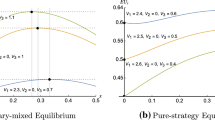Abstract
We construct a generalized Tullock contest under complete information where contingent upon winning or losing, the payoff of a player is a linear function of prizes, own effort, and the effort of the rival. This structure nests a number of existing contests in the literature and can be used to analyze new types of contests. We characterize the unique symmetric equilibrium and show that small parameter modifications may lead to substantially different types of contests and hence different equilibrium effort levels.
Similar content being viewed by others
References
Alexeev, M., & Leitzel, J. (1996). Rent shrinking. Southern Economic Journal, 62, 620–626.
Amegashie, J. A. (1999). The number of rent-seekers and aggregate rent-seeking expenditures: an unpleasant result. Public Choice, 99, 57–62.
Baker, R. (1996). Sperm wars: the science of sex. New York: Basic Books.
Baye, M., Kovenock, D. de-Vries, C. G. (1996). The all-pay auction with complete information. Economic Theory, 8, 291–305.
Baye, M., Kovenock, D., & de-Vries, C. G. (2005). Comparative analysis of litigation systems: an auction-theoretic approach. Economic Journal, 115, 583–601.
Baye, M., Kovenock, D. & de-Vries, C. G. (2010). Contests with rank-order spillovers. Economic Theory. doi:10.1007/s00199-009-0489-2.
Baye, M. R., & Hoppe, H. C. (2003). The strategic equivalence of rent-seeking, innovation, and patent-race games. Games and Economic Behavior, 44, 217–226.
Chung, T. Y. (1996). Rent-seeking contest when the prize increases with aggregate efforts. Public Choice, 87, 55–66.
Clark, D. J., & Riis, C. (1998). Contest success functions: an extension. Economic Theory, 11, 201–204.
Cohen, C., & Sela, A. (2005). Manipulations in contests. Economics Letters, 86, 135–139.
D’Aspremont, C., & Jacquemin, A. (1988). Cooperative and noncooperative R&D in duopoly with spillovers. American Economic Review, 78, 1133–1137.
Farmer, A., & Pecorino, P. (1999). Legal expenditure as a rent-seeking game. Public Choice, 100, 271–288.
Garfinkel, M. R., & Skaperdas, S. (2000). Conflict without misperceptions or incomplete information—how the future matters. Journal of Conflict Resolution, 44, 793–807.
Glazer, A., & Konrad, K. (1999). Taxation of rent-seeking activities. Journal of Public Economics, 72, 61–72.
Grossman, H. I., & Mendoza, J. (2001). Butter and guns: complementarity between economic and military competition. Economics of Governance, 2, 25–33.
Kamien, M., Muller, E., & Zang, I. (1992). Research joint ventures and R&D cartels. American Economic Review, 82, 1293–1306.
Kaplan, T., Luski, I., Sela, A., & Wettstein, D. (2002). All-pay auctions with variable rewards. Journal of Industrial Economics, 4, 417–430.
Konrad, K. A. (2009). Strategy and dynamics in contests. London: Oxford University Press.
Lee, S., & Kang, J. (1998). Collective contests with externalities. European Journal of Political Economy, 14, 727–738.
Matros, A., & Armanios, D. (2009). Tullock’s contest with reimbursements. Public Choice, 141, 49–63.
Öncüler, A., & Croson, R. (2005). Rent-seeking for a risky rent: a model and experimental investigation. Journal of Theoretical Politics, 17, 403–429.
Sheremeta, R. M. (2010a). Contest design: an experimental investigation. Economic Inquiry (accepted).
Sheremeta, R. M. (2010b). Experimental comparison of multi-stage and one-stage contests. Games and Economic Behavior, 68, 731–747.
Skaperdas, S. (1996). Contest success functions. Economic Theory, 7, 283–290.
Skaperdas, S., & Gan, L. (1995). Risk aversion in contests. Economic Journal, 105, 951–962.
Tullock, G. (1980). Efficient rent seeking. In J. M. Buchanan, R. D. Tollison, & G. Tullock (Eds.), Toward a theory of the rent-seeking society (pp. 97–112). College Station: Texas A&M University Press.
Author information
Authors and Affiliations
Corresponding author
Rights and permissions
About this article
Cite this article
Chowdhury, S.M., Sheremeta, R.M. A generalized Tullock contest. Public Choice 147, 413–420 (2011). https://doi.org/10.1007/s11127-010-9636-3
Received:
Accepted:
Published:
Issue Date:
DOI: https://doi.org/10.1007/s11127-010-9636-3




